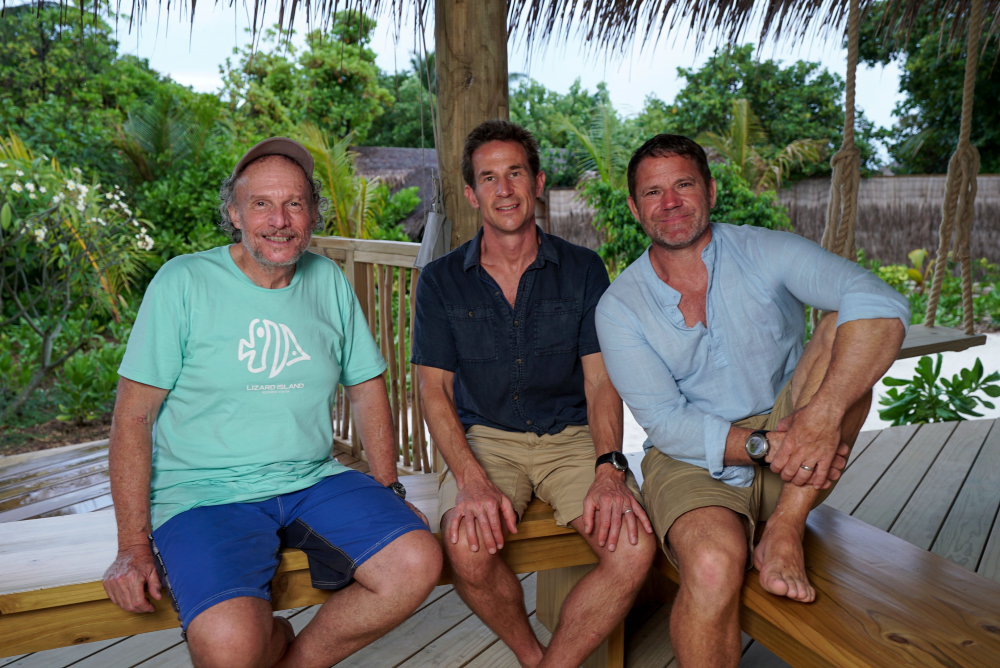In the Maldives, a team of scientists are putting on what they’ve coined “Live Aid for corals”. Previous investigations have revealed that when convincing baby corals (aka larvae) to set up camp, they can be swayed by the sound of a bustling reef, but will avoid areas that are too quiet.
So, how can we convince them to settle on reefs that need rebuilding? With some underwater speakers and a bit of creative realtor work.
Prof Steve Simpson of the University of Bristol has been studying the soundscape of underwater environments to see what they can tell us about the health of a habitat, a monitoring approach known as “ecoacoustics”. We often imagine corals as quiet and stationary, but the truth is that a healthy reef is a symphony of sound, and the corals living there had to swim to join the party – a fact that knocked presenter Steve Backshall’s socks off.
When asked what the most standout moment from filming for Our Changing Planet, Backshall told the BBC: “It would be finding that coral as it moves, as zooplankton can hear the difference between denuded and healthy reefs and it could swim towards the healthy one to set up and start growing there.”
We’re trying to use the soundscape to bring in the next generation that then can start to create the healthy reef that makes the sound itself.
Prof Steve Simpson
The discovery was one that even coral expert Simpson didn’t see coming.
“I remember the first time we worked on this where someone in the Caribbean had our sound systems, and [they] said, ‘We’re going to chuck some corals in the choice chambers.’ And I said, ‘You’re crazy, there’s no way a coral can respond to sound, it doesn’t have ears, it doesn’t have a brain.’ And sure enough, he sent me the videos the next day of these corals moving towards the sound,” Simpson told IFLScience.
The feat is made possible thanks to the wet-tennis-ball-like shape of coral larvae, that use their fuzzy hair cells to achieve directed swimming. Once the team had established that sound was important in dictating that direction, they got to work seeing how science could use this understanding to help establish new reefs.
“We are now using speakers to actually create these artificially healthy environments in terms of the soundscape, which call in the next generation of animals to give that reef and accelerated recovery,” he explained. “So, we can call in the fish, we can call in the corals. And we’re trying to use the soundscape to bring in the next generation that then can start to create the healthy reef that makes the sound itself.”
It’s a world-first approach for corals, having only been tested on experimental scales in Australia with a focus on fish communities. In Our Changing Planet: Restoring Our Reefs, Simpson teams up with Prof Peter Harrison (father of “coral IVF”) to persuade buckets of coral larvae to set up camp, and they’ll be returning to see how the new “recruits” are doing a year on. Excitingly, those that are established could be expected to start spawning by the age of three.
It’s no secret that corals and reefs have been suffering under environmental changes caused by the ongoing climate crisis, but as Simpson urges, there is light at the end of the tunnel if we can just get through the next few testing decades.

Left to right: Prof Peter Harrison, Prof Steve Simpson, presenter Steve Backshall.
Image credit: BBC Studios/Gemma Gilbride
“Five years ago, any coral reef restoration that I was involved in, I had a sneaking suspicion that [we] were just prolonging the death of coral reefs, it was inevitable that we were going to lose them with climate change,” he said. “The two things that have started to really get all of us excited are the fact that we’re getting these methods, that are increasingly scalable, that we can work over much, much larger areas, and around the world with fairly low tech, but high output solutions, and also that we’re seeing change in the data about climate change.”
If we can save coral reefs, we can save anything.
Prof Steve Simpson
“We know that coral reefs are going to have a really rough next two or three decades, but there’s a good chance that by the end of this century, it will be a better time than it is now for coral reefs… I think it’s starting to feel like it’s all hands to the pump while we’ve got this crisis, but it’s going to be worth it in the long run if we can keep coral reefs alive now. And if we can save coral reefs, we can save anything.”
Tune in to BBC One on 21 April, 6pm BST, to see Our Changing Planet: Restoring Our Reefs, or catch it on iPlayer.
Source Link: World-First Approach To Save Corals Plays Their Babies A Reef Soundtrack